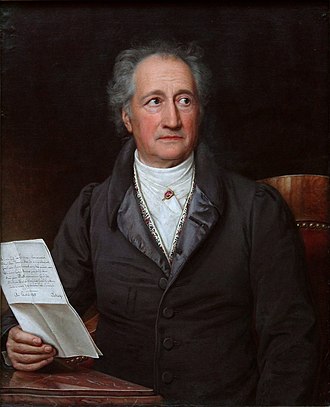Johann Wolfgang von Goethe

Oil painting by Joseph Karl Stieler, 1828[1]

Johann Wolfgang von Goethe (b. August 28, 1749 in Frankfurt am Main as Johann Wolfgang Goethe; † March 22, 1832 in Weimar), ennobled in 1782, was a German poet and natural scientist. He is considered to be one of the most important creators of German-language poetry.
Goethe came from a distinguished bourgeois family. As Stadtschultheiß, his maternal grandfather was the highest judicial official in the city of Frankfurt, and his father was a doctor of law and imperial councillor. He and his sister Cornelia received an extensive education from tutors. Following his father's wishes, Goethe studied law in Leipzig and Strasbourg and then worked as an advocate in Wetzlar and Frankfurt. At the same time, he followed his inclination towards poetry, achieving early success and recognition in the literary world with the drama Götz von Berlichingen.
At the age of twenty-six, he was invited to the court of Weimar, where he eventually settled for the rest of his life. As a friend and minister of Duke Carl August, he held political and administrative offices there and directed the court theatre for a quarter of a century. After his first decade in Weimar, Goethe’s official activities and the ensuing neglect of his creative abilities triggered a personal crisis, which Goethe escaped by fleeing to Italy. He experienced the two-year journey to Italy as a "rebirth”, owing the completion of important works (Tasso, Iphigenia, Egmont) to it.
After his return, his official duties were largely limited to representative tasks. The wealth of cultural heritage he experienced in Italy stimulated his poetic production, and his erotic experiences with a young Roman woman led him, upon his return, to enter into a lasting, "socially unacceptable" love affair with Christiane Vulpius, which he did not officially legalize through marriage until eighteen years later.
Goethe's literary works include poetry, drama, epic poetry, autobiographical writings, writings on art and literary theory, as well as scientific writings. In addition, his extensive correspondence is of literary importance. Goethe was the forerunner and most important representative of the Sturm und Drang movement. His novel Die Leiden des jungen Werthers brought him fame throughout Europe. Even Napoleon invited him to an audience on the occasion of the Erfurt Congress of Princes. In league with Schiller and together with Herder and Wieland, he embodied Weimar Classicism. The Wilhelm Meister novels became exemplary precursors of German-language artistic and education novels (Bildungsroman). His Faust gained a reputation as the most important creative work in German-language literature. In his old age, he was also regarded abroad as a representative of intellectual Germany.
In the German Empire, he was glorified as the German national poet and herald of the "German essence" and, as such, was appropriated for German nationalism. This led to a veneration not only of the poet's work, but also of his personality, whose way of life was considered exemplary. To this day, his poems, dramas and novels are among the masterpieces of world literature.
Literature
- Johann Wolfgang von Goethe: Sprüche in Prosa. Einleitungen und Anmerkungen von Rudolf Steiner, Vlg. Freies Geistesleben, Stuttgart 1967
- Rüdiger Safranski: Goethe - Kunstwerk des Lebens. Biographie, Hanser Vlg., München 2013, ISBN 978-3-446-23581-6
- Friedrich Hiebel: Goethe. Die Erhöhung des Menschen. Perspektiven einer morphologischen Lebensschau, Fischer-TB, Frankfurt a.M. 1982
- Rudolf Steiner: Einleitungen zu Goethes Naturwissenschaftlichen Schriften, GA 1, Dornach 1987 English: rsarchive.org German: pdf pdf(2) html mobi epub archive.org
- Rudolf Steiner: Grundlinien einer Erkenntnistheorie der goetheschen Weltanschauung mit besonderer Rücksicht auf Schiller, GA 2, Dornach 2003 English: rsarchive.org German: pdf pdf(2) html mobi epub archive.org
- Rudolf Steiner: Goethes Weltanschauung, GA 6, Dornach 1990 English: rsarchive.org German: pdf pdf(2) html mobi epub archive.org
- Rudolf Steiner: Das Karma des Berufes des Menschen in Anknüpfung an Goethes Leben, GA 172 (2002), ISBN 3-7274-1720-X English: rsarchive.org German: pdf pdf(2) html mobi epub archive.org
 |
References to the work of Rudolf Steiner follow Rudolf Steiner's Collected Works (CW or GA), Rudolf Steiner Verlag, Dornach/Switzerland, unless otherwise stated.
Email: verlag@steinerverlag.com URL: www.steinerverlag.com. Index to the Complete Works of Rudolf Steiner - Aelzina Books A complete list by Volume Number and a full list of known English translations you may also find at Rudolf Steiner's Collected Works Rudolf Steiner Archive - The largest online collection of Rudolf Steiner's books, lectures and articles in English. Rudolf Steiner Audio - Recorded and Read by Dale Brunsvold steinerbooks.org - Anthroposophic Press Inc. (USA) Rudolf Steiner Handbook - Christian Karl's proven standard work for orientation in Rudolf Steiner's Collected Works for free download as PDF. |
References
- ↑ As the poet himself noted, this is an idealising depiction. As Stieler reports, Goethe had said: "You show me how I could be. I would be happy to have a word with this man in the picture. He looks so beautiful that he could probably get another wife." Quoted from: Jörn Göres, Emil Schaeffer (eds.): Goethe. His Outward Appearance. Literary and artistic documents of his contemporaries. Insel Verlag, Frankfurt am Main 1999, p. 179.
| This article is partly based on the article Johann Wolfgang von Goethe from the free encyclopedia de.wikipedia and is licensed under Creative Commons Attribution/Share Alike. Wikipedia has a list of authors available. |
